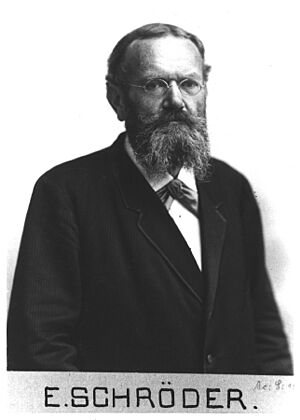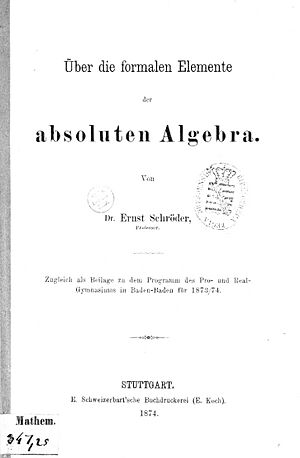Ernst Schröder (mathematician) facts for kids
Quick facts for kids
Ernst Schröder
|
|
|---|---|

Ernst Schröder
|
|
| Born | 25 November 1841 |
| Died | 16 June 1902 (aged 60) |
| Nationality | German |
| Scientific career | |
| Fields | Mathematics |
Friedrich Wilhelm Karl Ernst Schröder (born November 25, 1841, in Mannheim, Germany – died June 16, 1902, in Karlsruhe, Germany) was an important German mathematician. He is mostly known for his work on algebraic logic. This field uses algebra to study logic.
Schröder played a big part in the history of mathematical logic. He brought together and expanded on the ideas of other famous logicians. These included George Boole, Augustus De Morgan, and especially Charles Sanders Peirce. His most famous work is a large three-volume book called Vorlesungen über die Algebra der Logik (Lectures on the Algebra of Logic). This book helped make mathematical logic a separate field of study in the 20th century.
Contents
Ernst Schröder's Life
Ernst Schröder studied mathematics at several universities. He attended Heidelberg, Königsberg, and Zürich. After finishing his studies, he taught at a school for a few years.
In 1874, he started working at the Technische Hochschule Darmstadt. Two years later, he became a professor of mathematics. This was at the Karlsruhe Polytechnische Schule. He stayed there for the rest of his life. Schröder never got married.
Schröder's Mathematical Work
Schröder's early work on algebra and logic was done without knowing about the British logicians George Boole and Augustus De Morgan. He learned from other mathematicians like Ohm, Hankel, and Hermann Grassmann.
In 1873, Schröder discovered the work of Boole and De Morgan. He then added important ideas from Charles Sanders Peirce to their work. These ideas included how to group things together (subsumption) and how to talk about "all" or "some" (quantification).
Schröder also made his own contributions to other areas of math. These included algebra, set theory (the study of collections of objects), and lattice theory. He also worked on ordered sets and ordinal numbers.
Schröder, along with Georg Cantor, helped discover the Cantor–Bernstein–Schröder theorem. This theorem is about comparing the sizes of sets. Schröder's proof of this theorem (from 1898) had some mistakes. Later, Felix Bernstein corrected the proof.
The Operation Circle of Logic Calculus
In 1877, Schröder published a short book called Der Operationskreis des Logikkalküls. This book clearly explained Boole's ideas about algebra and logic. It helped introduce Boole's work to readers in Europe.
Unlike Boole, Schröder fully understood the idea of duality. This is when two concepts are related in a way that swapping them still makes sense. Other logicians like John Venn and Christine Ladd-Franklin praised this book. Charles Sanders Peirce even used it as a textbook.
Lectures on the Algebra of Logic
Schröder's most important work was his Vorlesungen über die Algebra der Logik. This large book was published in three volumes between 1890 and 1905. The second part of Volume 2 was published after his death.
The Vorlesungen was a detailed study of algebraic logic up to the end of the 19th century. It greatly influenced how mathematical logic developed in the 20th century. Schröder expanded on Boole's algebra. He turned it into a way to calculate relationships between things. He used the idea of combining relationships like multiplication.
Schröder explained his goal for this work:
...to design logic as a calculating discipline, especially to give access to the exact handling of relative concepts, and, from then on, by emancipation from the routine claims of natural language, to withdraw any fertile soil from "cliché" in the field of philosophy as well. This should prepare the ground for a scientific universal language that looks more like a sign language than like a sound language.
He wanted to create a clear, calculating way to use logic. He hoped this would help people think more precisely. He also wanted to create a scientific universal language that used symbols instead of spoken words.
Schröder's Impact on Logic
Schröder's work had a huge impact on the early development of predicate calculus. This is a system used in mathematical logic. He helped make C. S. Peirce's ideas about quantification (like "all" and "some") more popular. His influence was as important as that of Frege or Peano.
For example, the ideas about relationships found in the famous book Principia Mathematica came a lot from Schröder's Vorlesungen. This book was mentioned in the preface of Principia Mathematica.
Some historians have focused more on Frege's role in logic. However, philosopher Hilary Putnam (1982) pointed out Schröder's importance. He said that Schröder's Vorlesungen quickly became the most well-known advanced logic textbook. It showed what any mathematician interested in logic should have known in the 1890s.
Putnam also noted that many famous logicians used Peirce-Schröder's way of writing logic. For example, Leopold Löwenheim proved the Löwenheim theorem using Peirce's notation. Also, Ernst Zermelo presented his axioms for set theory using Peirce-Schröder notation.
Putnam explained that while Frege might have discovered the quantifier first, Peirce and his students made it widely known. Schröder helped spread these ideas. Until Bertrand Russell recognized Frege's work, Peirce was known to almost everyone in the logic community.
Works
- Schröder, E., 1877. Der Operationskreis des Logikkalküls. Leipzig: B.G. Teubner.
- Schröder, E., 1890–1905. Vorlesungen über die Algebra der Logik, 3 vols. Leipzig: B.G. Teubner. Reprints: 1966, Chelsea; 2000, Thoemmes Press.
- Vorlesungen über die Algebra der Logik (Exakte Logik), Volume 1,
- Vorlesungen über die Algebra der Logik (Exakte Logik), Volume 2, Abt. 1
- Vorlesungen über die Algebra der Logik (Exakte Logik), Volume 2, Abt. 2
- Algebra und Logik der Relative, der Vorlesungen über die Algebra der Logik 3, Volume 3, Abt. 1
- Schröder, E., 1898. "Über zwei Definitionen der Endlichkeit und G. Cantor'sche Sätze", Abh. Kaiserl. Leop.-Car. Akad. Naturf 71: 301–362.
See also
 In Spanish: Ernst Schröder para niños
In Spanish: Ernst Schröder para niños
- Schröder's equation
- Schröder number
- Schröder–Bernstein property
- Schröder–Bernstein theorem for measurable spaces
- Schröder–Hipparchus number


